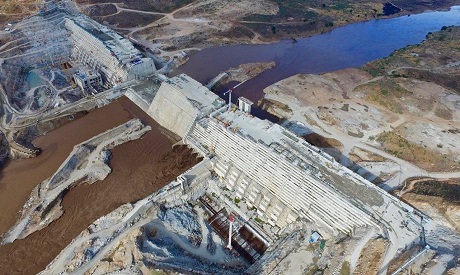Date: Thursday, 19 April 2018

The meeting, the second this month, will also include the ministers of irrigation and the heads of the intelligence agencies of each country.
Convening a second round of negotiations in the same month demonstrates the determination of all three parties to reach agreement, says former deputy foreign minister Mohamed Hegazi.
Ethiopia, Sudan and Egypt committed themselves to overcoming the negotiating impasse during January’s African Union summit.
“We will continue to comply with the instructions of our political leaders to break this deadlock between 5 April and 5 May,” Shoukri told the media last week.
The ministers have been given a month to reach agreement.
Hegazi stresses that water negotiations are an extended process and failure to agree in one round does not mean the whole process has failed.
A difference on one or two issues does not translate into deadlock, says Mohamed Ezz, chairman of the Nile Foundation for African and Strategic Studies (NFASS). “It only suggests the viewpoints of the three parties need more time to coalesce into a consensus.”
The three countries agree in principle the dam should not harm any party. They should therefore be able to eventually reach a formula that will not cause harm, adds Ezz.
The last round of talks, held earlier this month in Khartoum, ended without any outstanding differences being resolved.
Shoukri described the Khartoum talks as “transparent”. Though they addressed many issues in the end they bore no fruit, he said.
His Sudanese counterpart Ibrahim Al-Ghandour described the meetings as “constructive, detailed and important”, adding that controversial issues need patience and political will to be resolved.
The most contentious issues remain the timetable for filling the dam’s reservoir and the operating protocols of the dam, both of which have been referred to the Cairo tripartite technical meeting.
The building of the dam started in April 2011. It is now more than 60 per cent complete and is scheduled to begin partial operation later this year.
Egypt has repeatedly expressed its fears the dam would negatively impact its water quota. Ethiopia, in turn, has repeatedly emphasised the dam will cause no harm to Egypt but has yet to produce any studies in support of the assertion.
The filling period is not a one-off process, says Hegazi. Synchronising the filling process in line with the water needs of all three countries, he argues, will pave the way for closer political and economic ties that will create stability in the region.
“Extending the filling time to seven or even 10 years is a relatively simple way to meet Egyptian demands and counter any negative impacts of the dam,” he says.
The Khartoum meeting was the first to be held after Ethiopian Prime Minister Abiy Ahmed came to power after his predecessor Hailemarian Desalegn’s sudden resignation in February.
Hopes are pinned on the change in the leadership of Ethiopia leading to a change in Addis Ababa’s position on technical negotiations.
In November 2017 the 17th round of tripartite talks was held in Cairo.
Egypt endorsed the preliminary consultative report but Sudan and Ethiopia demanded changes.
The negotiations reached a deadlock and Egypt’s minister of irrigation declared they had failed.
New life was injected into the negotiation when the leaders of Egypt, Sudan and Ethiopia met on the sidelines of the African Union (AU) Summit in Addis Ababa in January and agreed to remove all obstacles in the way of tripartite negotiations.
Despite the meandering course hopes are strong a compromise will be reached. Hegazi believes all parties must now work on reaching a consensus over the management of the dam and a wider agreement covering water storage for all dams in the three countries.
“Water can become part of an overall cooperation process between the three states,” he says.
The minister of electricity’s visit to Sudan earlier this month to discuss establishing a 220,000-voltage-capacity electricity linkage could, he argues, be the start of bilateral and trilateral agreements covering joint power grids and railway lines.
Ezz points to the role popular diplomacy is playing in easing differences.
“Nile Basin countries are linked by cultural and social ties and share a common civilisation and history. NGOs seek to cast the spotlight on these common factors for the good of all.”